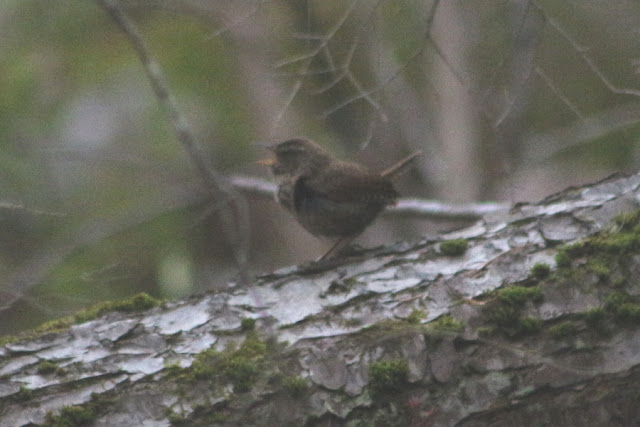 |
| Saturday, May 9th |
I've heard of April Showers, but Snow on Mayflowers?
 |
| Snow on the mayflowers (trailing arbutus). |
Yes, we had a bit of snow yesterday, and some cool weather all week. There haven't been a lot of birds singing their spring songs on those cold mornings, but I did hear one bird that was appropriate for the weather: a winter wren. These are easy to hear as they have a loud, bright song for such a tiny bird, but they are much harder to see since they spend their time down on the forest floor poking around in the leaf litter. The guide books will tell you they like to hop along fallen trees looking for insects, and that's just where I was able to spot one, right as it was belting out its effervescent song on this early, cold, dark morning.
 |
| A winter wren sings its outsize song. |
Well, that's New England weather, and being New England, of course there were beautiful days this week too. On one of the nice days I learned yet again that you don't have to travel off the beaten path to find interesting nature sights. During a run along Chemung Road on one nice day I looked down and saw these emerging lily pads in Lake Wicwas right beside the road.
 |
| New lily pads under the water. |
We've all seen lily pads many times in the summer and they are always green, packed with chlorophyll from photosynthesis. But these new leaves are just forming and were still a couple of inches below the surface of the lake. Like the leaves of the red maple tree, lily pads must have red pigment in them that's only visible before (and after) photosynthesis dominates the color palate. It's the same reason leaves turn color in the fall as photosynthesis ceases. Very soon these lily pads will rise to float on the surface of the water where they will become green with chlorophyll as they turn sunlight and carbon dioxide into energy for the plant. It's nature's little power plant.
Now to the fox. Our local fox has been relegated to walking on land since the ice left the lake, and on another early morning I found it on the hunt for breakfast. It was so intent on tracking down its meal that it didn't notice me and I got to watch it for a couple of minutes - it was on the track of a small rodent.
I have seen chipmunks in the the pile of rocks it was studying so that may have been the source of its attention, but there are likely mice in there too. Even though fox have good noses, they hunt by sense of sound. Scent can linger for a long time, so if they went searching after every scent they came across they'd have a low success rate. But if they hear something, they know their meal is present right now. This fox stood silently listening. It cocked its head one way and the other to best hear the rodent.
Then it would tip its ears forward, or rotate them to the side, all in an attempt to geo-locate the exact spot.
Now if it were winter, once pinpointed under the snow, the fox would jump up in the air and pounce down upon it, catching it under the snow with its paws. But in this case, it either lost the track, or decided the rampart was too much to breach, and it went on its way to search for a more accessible meal.
Hopefully I won't be seeing fox tracks in the snow for many months now - we just need old man winter will let up a bit and let mom enjoy some nice spring weather.
 |
| Primrose, courtesy of Linda. |
Happy Mother's Day to all, wherever you are and whatever weather your day brings you!
 |
| A virtual hug for mom. |



No comments:
Post a Comment